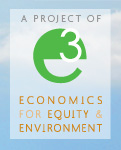The concept of green economy is being widely used in policy circles and debates between stakeholders of various backgrounds. However, how is this concept useful for pushing forward discussions on climate policy planning or policymaking promoting more sustainable development outcomes? And to what extent is it consistent with the body of scholarship that we call “real climate economics”? Perhaps the clue is in the terminology being used and its associated definitions. If one were to put in front of you two words, “green economy”, what would your first take on this be? My first reaction (putting aside any previous knowledge of the term): an economy that produces goods for human consumption by respecting nature and harnessing its potential efficiently and without damage. A quick literature review reveals this is only partly true.
According to UNEP, a green economy is “an economy that results in improved human well-being and reduced inequalities over the long term, while not exposing future generations to significant environmental risks and ecological scarcities.” This is almost a different ball-game. From this standpoint, the green economy concept may usefully frame policy discussions, given that it provides alternative operational interpretations of the concept of sustainable development. There are both advantages and disadvantages to this.
On the positive side, the green economy concept offers the economics discipline further opportunities to reinvent itself for a better handling of 21st century problems. Related to this, it may also spread the understanding of new climate economic research strands. The concept of green economy may help draw increased attention to the importance of analysing climate damages and policy responses from a system dynamics point of view, whereby the economy, environment and society interact across time and space. The evaluation of climate policy costs and impacts could be framed using alternative frameworks of analysis drawing on multi-criteria and risk assessments (instead of the much over-used and limited cost-benefit analysis approach). It could act as a reminder: the economy is intrinsically embedded in nature and cannot function without ecosystems’ support.
Nonetheless, there are also limitations to the green economy as defined above. For a starter, the “short term” is sidelined. Short term policy implications in the area of climate change or other “green investments” are strikingly relevant for policy makers and their political plans. In addition, any action on the short term may create a dependency path in the long term, since the latter is after all a chronological sequence of the former. The concept may also send a wrong signal if it is equated with the idea that the environment can be price-tagged and all climate impacts can be monetised as if they were standard market transactions, an approach preferred by traditional economists. Though this is theoretically possible, it is not realistic, does not help the understanding of the problem and, most importantly, perhaps not ethically desirable. One might have to concede, though, the sad reality that policy makers and politicians appear to care about environmental protection only if the ecosystems in question are proven to be worth exorbitant amounts of money.
Finally, for the lay person, the concept of a green economy may be misinterpreted as being concerned only about nature, without due consideration to poverty or equity (though it clearly is according to the UNEP definition above). In other words, it is questionable to what extent the terminology choice of “green economy” is helpful. In a similar fashion, one could talk about a “red economy” to emphasise the issue of poverty and equity (including access to environmental services); or a “deep blue” economy to stress the importance of technological innovation and high tech developments. It remains to be seen if “colouring the economy in green” will significantly change policymaking towards more sustainable outcomes or spur new thinking in climate economics, or the economics of the environment in general. What is clear, though, is that there is an increasing urgency to redefine economics, vitalise it, modernise it, and bring it up to speed with our surrounding reality.

